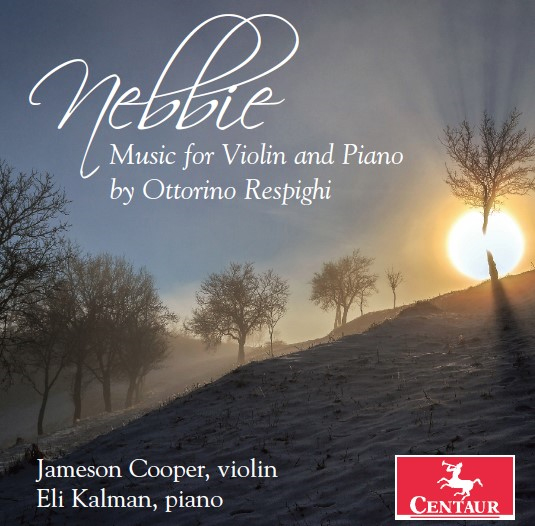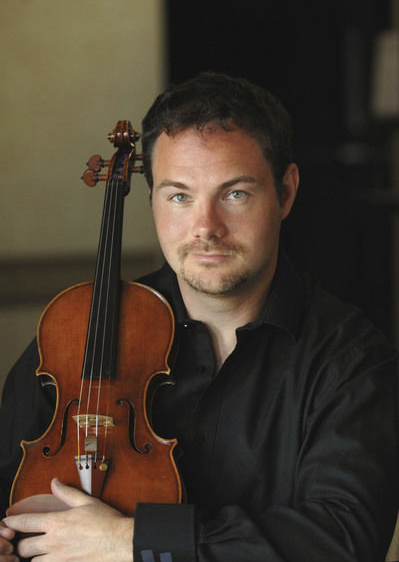Violinist Jameson Cooper/pianist Eli Kalman: Nebbie, Music by Respighi — interview/review
Buy the CD
Buy the music to Respighi’s Sonata for Violin and Piano in D minor
Visit Jameson Cooper’s website
Visit Eli Kalman’s website
Music Lovers cherish Italian composer Ottorino Respighi (1879-1936) for his powerfully visual orchestral tone poems The Pines of Rome, Fountains of Rome and Roman Festivals. His works for chamber orchestra also captivate the imagination by achieving wondrous levels of orchestral imagery. Respighi’s flair for sound color animates The Birds and Brazilian Impressions, which reimagine the already descriptive melodies of Renaissance and Baroque animist composers. Ancient Airs and Dances, three chamber orchestra suites inspired by lute pieces from the 16th and 17th centuries conjure technicolor daydreams of courtly life in Respighi’s brilliantly fleshed out orchestrations.
Considering his popularity as a colorist, it’s a bit puzzling Respighi’s not immodest portfolio of vocal and instrumental chamber music has been programmed less frequently. Violinist Jameson Cooper, with scholarly as well as collaborative assist from pianist Eli Kalman has produced a magnificent antidote to this conundrum. The duo’s 2018 Centaur release Nebbie: Music for Violin and Piano by Ottorino Respighi resonates with energy and finesse, revealing a composer of refined taste and temperament; the vast landscapes of his orchestral writing reduced like great poetry, to exquisite miniature.
Recorded in the Music Hall of the Arts and Communications Center at the University of Wisconsin Oshkosh and mastered meticulously by Kevin Harbison, the program on this revelatory CD is a beauty. Three of Respighi’s most elegant and descriptive songs, Nebbie (mists); Pioggia (rain) and Lo Sono la Madre (I am the mother) in thoughtful adaptations for violin and piano by Jameson Cooper serve as sweet meditations between two signature masterpieces, the lesser known Violin and Piano Sonata in D minor (1897) and the slightly more familiar Violin and Piano Sonata in B minor (1917).
Violinist Jameson Cooper is Artist In Residence at the Ernestine M. Raclin School of the Arts, Indiana University South Bend. Founding first violinist of the Euclid Quartet, whose repertoire is as vast and interwoven as string theory - Haydn passing through Marsalis - Cooper is able to look afresh at late nineteenth century repertoire and discover sunbursts, postulate subtexts and execute complicated passagework with intuitive vigor and expressive self-confidence.
Pianist Eli Kalman, who discovered and performed the premiere of the Violin Sonata in D minor is Professor of Piano at the Department of Music University of Wisconsin Oshkosh. He is the perfect embodiment of the best of old school, a steadying yin to Cooper’s eagerly emphatic yang. Kalman’s solid musicality and tempered understanding of give and take, statement and response anchor both sonatas in late romantic turf where they rightly belong. The three songs on this disc, quite freely and interestingly reimagined by Cooper are fluid, even impressionistic. Kalman and Cooper have forged a delightful artistic marriage for this CD, their distinct temperaments conflating to a union of superb artistic quality.
The Violin and Piano Sonata in D minor (1897) is first up on the disc and because it is so little known, surprises. Highly romantic in the best of all passionate ways, extraordinarily mellifluous, soaring and propulsive, its three movements look back to Schumann but also tap into a premonition of the free-spirited harmonic experimentation that would become fashionable with the impressionists a few years later. The first movement Lento, Allegro and particularly the second movement Adagio are pure Brahms, breathtakingly earnest and unaffected, performed with exquisite collaborative sensitivity by both artists. The last movement Scherzo dips carefully from time to time into twentieth century tonality but finds comfort still, in steadfast romanticism. An incredible discovery, the dynamic performance on this disc will convince colleagues the effort involved in preparing and adding the sonata to their recital portfolios will be rewarded handsomely; a solid and deeply moving work, performed with enlightened certainty about its place in the repertoire by the duo.
Jameson Cooper’s reimagining for violin and piano of three Respighi art songs Nebbie, Pioggia and Lo Sono la Madre are fresh mini-masterpieces in their new and expertly conceived setting. Cooper’s mastery of the violin and its expressive capability, his extraordinarily rich tone and inspiring execution of these “new works” grace and make clear, his command of the art of transcription; neither imitative nor condescending. Rather, wholly recreated, reinvented, revoiced. Respighi’s three songs are now new jewels in the violin/piano repertory.
Another monumental Respighi achievement, the Violin and Piano Sonata in B minor (1917) is honored by Cooper and Kalman with a glorious performance that highlights its virtuosity but more importantly, Respighi’s unbridled passion - an intimacy at once disarming and enlightening. Not unaware of the world falling apart around him in 1916-1917 as the First World War ravaged centuries of European certainty and established order, the B Minor sonata longs for what will never be again. Resignation is the path to redemption and Respighi takes the listener on that journey. Cooper gives the work lavish expressive license, ably vouchsafed by Kalman at the keyboard.
Definitive interpretations all, this CD sheds new light on a composer whose orchestral showmanship was nonpareil, but whose soul resided in his chamber music.
Daniel Kepl | Performing Arts Review


Daniel Kepl interviews violinist Jameson cooper and pianist Eli Kalman

Violin Sonata in B Minor, P. 110: I. Moderato

Violinist Jameson Cooper

Violin Sonata in B Minor, P. 110: III. Passacaglia. Allegro moderato ma energico

Pianist Eli Kalman

Pioggia, P. 90 (Arr. J. Cooper for Violin & Piano)

Pianist Eli Kalman and violinist Jameson Cooper met while hiking

Nebbie, P. 64 (Arr. J. Cooper for Violin & Piano)

Violin Sonata in D Minor, P. 15: III. Scherzo. Allegretto